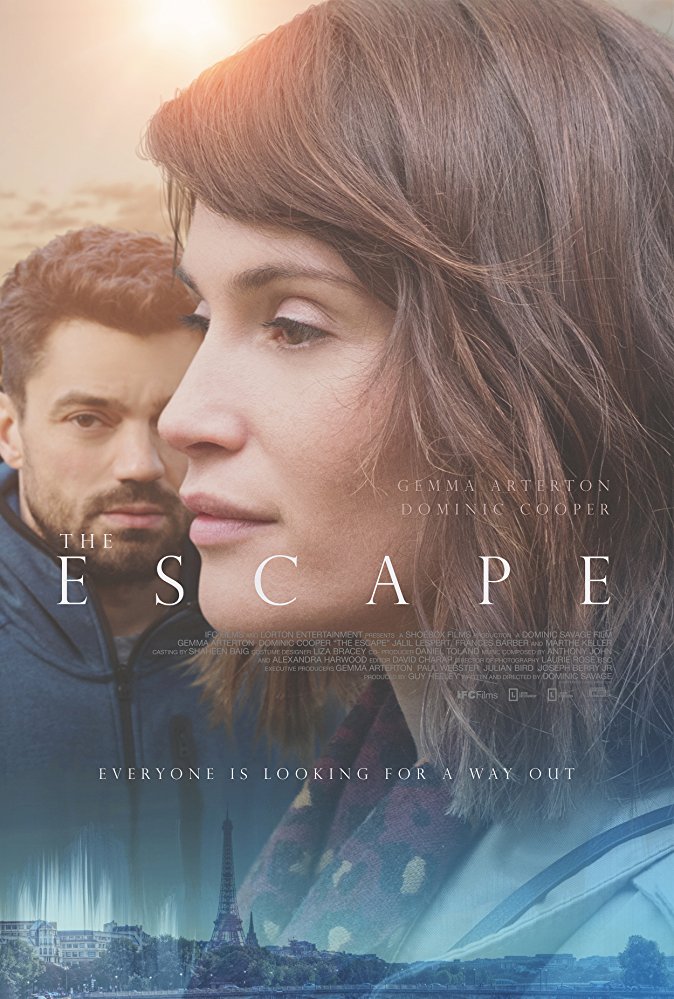
Revelation. A wonderful sense of glimpsing a world beyond the bounds of quotidian reality … this was the effect of seeing ‘The Escape’ film on Sunday night. It’s those recurring, evocative images of orange sunset glow behind black thatch of trees from speeding train window, that remain with me strongest. They remind me of writer CS Lewis’s description of his early and recurring childhood experience of a sweet sense, while gazing at the distant Mourne mountain peaks, of a beckoning mystery always just beyond and out of reach…
Tara, played by Gemma Arterton, is a housewife in suburban London with, from the viewpoint of her immediate social circle, a perfect life – nice house, two kids, husband with good job. But his scope and sympathies are limited, she’s not a ‘natural’ mum, and she becomes aware of an inner restlessness and desire for something her narrow circumstances can’t satisfy. A simple trip into London one afternoon, seeing people, scenes, and in particular some captivating art books, sets her on a quest for an inner freedom she has just begun to taste. When a cluster of domestic stresses conspires one morning to make her ‘snap’, she speeds off in the family car and buys a one way Eurostar ticket to Paris. There, she relishes fresh horizons of beauty and richness, loses herself in an art gallery displaying the ‘Lady and the Unicorn’ tapestry that had so enchanted her in the art book – and has a brief passionate tryst with a romantic French photographer.
But the morning after their night together, the revelation that he’s married, with a baby, jolts her back to reality. It’s only after a kind Parisian woman shelters her lost and vulnerable self the following night, that she finds the inner fortitude to face up to her own reality back home, and return to it – but with a hint that she is at least now more inwardly free to choose her path ahead.
I’m intrigued by the story’s wider resonances. Spurred by that inner restlessness, Tara through the prism of art has her eyes opened to a broader, richer reality than she had hitherto perceived. It’s a rich evocation of and parallel with the inner thirst that may lead someone on a spiritual quest, ‘to find God’. In our bustling western culture, a panoply of distractions – media, leisure pursuits, food obsessions, travel and more – combined with culture-bound thought habits, can effectively weave a web of blindness and antipathy toward spiritual truth and possibilities. Like the walls of domesticity and relational torpitude that imprison Tara. But just as a glimpse of a beauty beyond those walls propels Tara along a path of discovery, so a chance insight or encounter may set anyone on a path of spiritual adventure. Perhaps toward something like the ‘life in all its fullness’ that Jesus once spoke of. How we respond – ignore such overtures and allow the walls to contract and harden, or heed the whispers of grace and venture further into the garden of mystery and delight – is a choice we each are moment by moment making – and must make.
 On Radio 4’s ‘Today’ programme this morning, there was a short interview with astronaut Tim Peake, whose Soyuz Capsule currently resides at Peterborough Cathedral. A self-confessed agnostic and “not religious”, Peake has
On Radio 4’s ‘Today’ programme this morning, there was a short interview with astronaut Tim Peake, whose Soyuz Capsule currently resides at Peterborough Cathedral. A self-confessed agnostic and “not religious”, Peake has